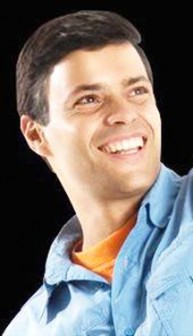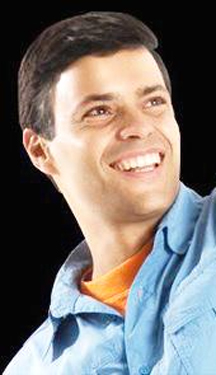CARACAS (Reuters) – A Venezuelan opposition leader was cleared by an international court yesterday to run against President Hugo Chavez in 2012, a ruling sure to heat up the race to lead Latin America‘s top oil exporting country.
Centrist candidate Court clears Venezuela candidate to challenge Chavez had been banned from campaigning by Venezuelan authorities who accuse him of corruption, but the Costa Rica-based Inter-American Court of Human Rights ruled in his favour.

“We are cleared to run!” a beaming Lopez shouted to supporters at a rally after the ruling where he promised to unite the opposition.
The court is part of the Organization of American States, or OAS, and its decisions are supposed to be binding. But Venezuela’s government said the Lopez ruling was politically motivated and it may still keep the Harvard-educated politician out of the presidential campaign.
Lopez, 40, made his name as mayor of the wealthy Chacao district in Caracas. He was favoured to go on to win the race for mayor of the whole city in 2008, but he and scores of other politicians—most from the opposition—were blocked by Chavez’s comptroller general.
Accused but not tried for corruption, Lopez was barred from seeking public office until 2014. He says the accusations are trumped up and called it unconstitutional to suspend him from politics without first giving him a trial.
The government issued a statement late yesterday saying Venezuela’s Supreme Court—which tends to side with Chavez—will have final say in the case.
“The Inter-American Court of Human Rights has regularly taken politically partial positions against Venezuela,” the statement said. “Decisions such as this one… clearly encourage corruption.”
Lopez says human rights are at the heart of his policies.
Polls show him toward the top of an opposition field led by Henrique Capriles Radonski, a state governor who promises to emulate Brazil’s “modern-left” policy model if elected.
Capriles Radonski sent a Tweet saying: “Justice always comes … We celebrate the Leopold Lopez decision.”
The opposition aims to pick a single candidate in a primary vote in February and then unite behind the winner to try to unseat Chavez in the election in October 2012.
Chavez was operated on for cancer in June and is undergoing chemotherapy. He vows to recover and be ready to take his campaign to the streets early next year.
Despite rampant crime, low private investment and one of the world’s highest inflation rates, Chavez remains Venezuela’s most popular politician, with approval ratings of about 50 per cent.
A former paratrooper, socialist Chavez was jailed for leading a military coup in 1992. He bounced back to win the 1998 presidential election and has dominated politics in the OPEC-member country ever since.
The 2012 campaign unofficially started this week when election authorities set the vote for Oct. 7.
“The victory of the revolution now has a date,” Chavez said in a televised conference call with a group of supporters on Tuesday. “Prepare for battle!”

